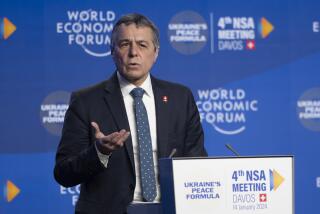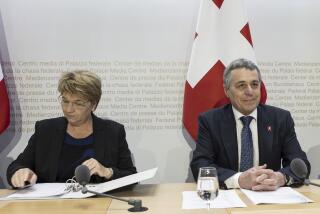15 Nonaligned Nations to Confer in Belgrade on Initiative for Gulf Peace
BELGRADE, Yugoslavia — A special closed-door conference of the Nonaligned Movement in Belgrade next week might produce a fresh initiative to restore peace in the Gulf, a senior Yugoslav diplomat hinted Friday.
“We have no illusions, but we do have certain hopes that we can exchange elements that would contribute toward the final goal” of a diplomatic solution, said Dragoslav Pejic, Belgrade’s ambassador for nonaligned affairs.
Yugoslavia, which now serves as chairman of the 102-nation Nonaligned Movement, called on foreign ministers from 15 nations to convene Tuesday to consider new “ideas and initiatives” for a negotiated settlement of the Gulf crisis, Pejic said.
While the Nonaligned Movement has seldom played a decisive role in resolving international crises, a proposal from Tuesday’s conference could offer Iraq’s President Saddam Hussein a face-saving alternative to continued warfare. Baghdad has refused to comply with United Nations’ resolutions demanding an immediate withdrawal of Iraqi troops from Kuwait, which Iraq invaded on Aug. 2 and declared its 19th province.
Asked why Yugoslavia is confident that the nonaligned group could make progress when numerous other international efforts have failed, Pejic said several peace proposals had been forwarded to the organization that warranted consideration. “Unfortunately, I cannot go into any details,” Pejic said. “All I can say is that we will act in several directions.”
Among the nations asked to take part in the conference are Iran, Egypt and Cyprus, which have been drawn into the crisis by their proximity to the war-torn region.
Pejic said Yugoslavia’s Foreign Ministry also is in regular contact with Iraq, in its capacity as nonaligned chairman.
Iranian President Hashemi Rafsanjani said this week that he has outlined a cease-fire proposal to Saddam Hussein and that Iran is willing to meet with the Iraqi president and U.S. officials to seek a peaceful resolution of the conflict.
The Iranian initiative reportedly calls for Iraq’s withdrawal from Kuwait, the departure of Western troops from the Gulf region and the creation of an Islamic peacekeeping force to act as a buffer between Iraq and Kuwait while negotiators work toward a regional accord ensuring respect of borders and national sovereignty.
Iran is probably seeking a speedy resolution of the Gulf War for fear of violence spreading to its territory, where dozens of Iraqi jets have taken refuge from the allied forces’ superior air power.
Although a peace initiative by the Nonaligned Movement would probably include many of the same conditions as the U.N. resolutions already rejected by Baghdad, it would provide the first appeal from a relatively neutral forum that might allow Iraq to reconsider its position since the allied attack began on Jan. 17.
However, an Iranian journalist in Belgrade, Ali Tabas, of the official IRNA news agency, speculated that the nonaligned gathering would do little more than restate U.N. policy because the countries invited all share allied views of how the war should be brought to an end.
The 15 nations asked to send their foreign ministers to the conference were selected to provide a good regional balance, Pejic said. The two nations at the center of the crisis, Iraq and Kuwait, both members of the Nonaligned Movement, were not invited because of their front-line involvement, the diplomat said.
Other states participating in Tuesday’s meeting will be India, Indonesia, Cuba, Ghana, Zambia, Zimbabwe, Nigeria, Algeria, Sri Lanka, Venezuela and Argentina.
Pejic said numerous other members of the Nonaligned Movement had asked to be included in next week’s peace effort but that Yugoslavia deemed it more productive to bring together a small group that could draft and agree on concrete proposals.
Yugoslav Foreign Minister Budimir Loncar was asked at a nonaligned meeting in New York in October to search for a compromise in the Gulf standoff. But Loncar’s initial efforts were thwarted by Saddam Hussein’s refusal to withdraw from Kuwait.
Serbia, the largest of Yugoslavia’s six republics, has sought to promote the Nonaligned Movement as a means of preserving some international prestige for the federation torn by nationalist conflicts. But the secessionist republics of Slovenia and Croatia dismiss the nonaligned forum as an inconsequential organization unlikely to contribute in any significant way to resolving the Gulf crisis.
More to Read
Sign up for Essential California
The most important California stories and recommendations in your inbox every morning.
You may occasionally receive promotional content from the Los Angeles Times.











